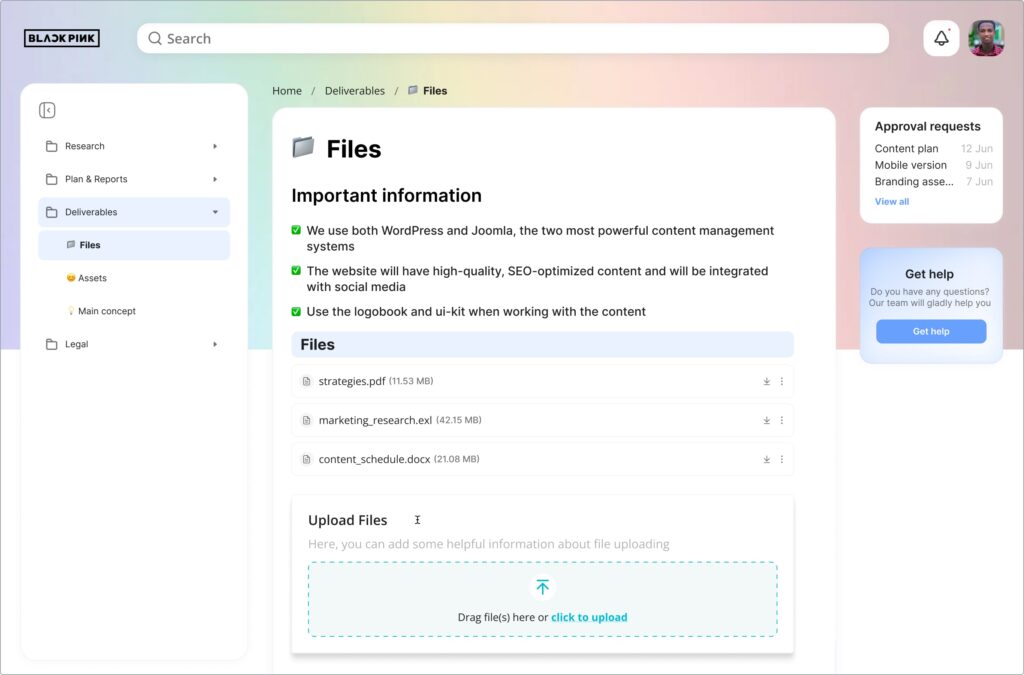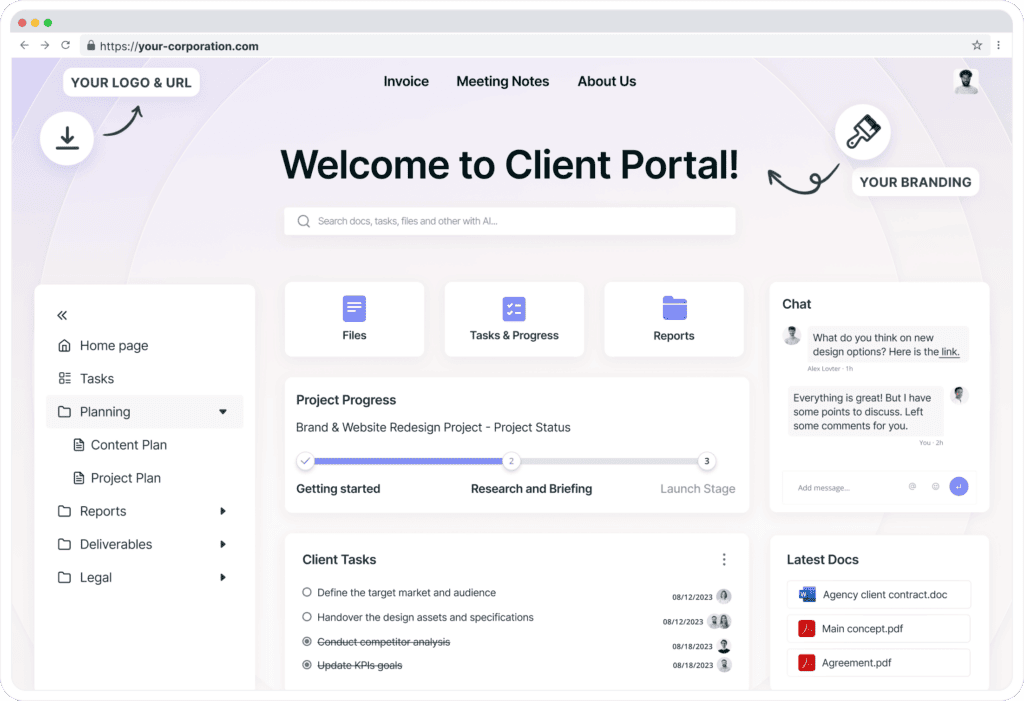
Marketing Information Management für Fachleute: Was es ist und warum es wichtig ist.
- 12 Min read
The business environment today is changing so quickly that knowledge management has become a critical aspect of success for both organizations and society. Those companies that collect, store and share information effectively generally enjoy a competitive advantage over their rivals on the market. In this article, we’ll explore the importance of knowledge management in the modern world, study the benefits of a knowledge base and look at how it can be implemented in a company.

What first comes to your mind when you hear ‘Knowledge base’? A collection of information? A library? These two words are simple, and you definitely know their meaning, but what exactly do they signify when used together? Let us have a closer look. A knowledge base is a centralized repository of information that provides easy access to knowledge and data on a specific topic, product, service or organization. It is, in fact, a collection of well-organized and structured information that can be used to support problem-solving and learning (for example, when onboarding). One of the primary knowledge base benefits is that it allows for quickly accessing and sharing information.
A knowledge center may consist of articles, tutorials, how-to guides, FAQs, troubleshooting tips and other types of documentation that help users find answers to their questions and solve their problems. The knowledge base benefits not only the users but also the company, as it significantly reduces the burden on customer support since customers have the ability to find answers to their questions themselves.
Quick and easy access to information is one of the most significant benefits of having a knowledge base. With a well-established knowledge base, searching and finding what you need have never been easier.
Without a centralized repository, important information can be scattered across different platforms, systems or individuals, making it difficult and time-consuming to locate. Knowledge repositories streamline this process by bringing together all relevant information in one place, where it can be easily accessed and searched.
Minimizing response time is important for businesses that aim to provide excellent customer service and support. A knowledge base can help reduce the time taken to respond to customer inquiries by offering quick access to answers. This is especially beneficial for addressing repetitive or frequently asked questions with standard responses, as the team can use the freed time to focus on more complex issues that require human intelligence.
Consistency in information is crucial for businesses, particularly those that operate in regulated industries or rely on accurate data and processes. Providing employees with inconsistent information may cause errors, confusion and a great deal of irritation which doesn’t contribute to efficient work. Having a knowledge base, businesses can make sure all team members are on the same page, reducing the risk of misinformation and eliminating the need to redo the work.
Knowledge bases are quite often equipped with version control features, which allow users to track changes made to the information and quickly identify who made changes, as well as when, where and why they were made.
Everyone knows a satisfied customer is a repeat customer. So it’s essential to make sure customers have a positive experience with your company. Customer satisfaction is another knowledge base benefit, as it lets customers independently find answers to their queries without needing to contact support.
More than that, with the self-service options customers can access information outside of regular business hours, in other words, whenever they need it. Convenient, right?
Productivity is critical for businesses that want to remain competitive and efficient in their operations. A knowledge base can reduce the time and effort required to complete tasks by providing best practices, templates and other resources.
A knowledge repo is like a virtual library, brimming with valuable resources that can be leveraged to streamline workflows and improve overall efficiency. By integrating a well-designed data hub into their operational framework, businesses can empower their employees to perform their duties more effectively. Instead of spending countless hours searching for information or reinventing the wheel.
Knowledge base benefits also include improved communication and collaboration among team members, as everyone has access to the same up-to-date and accurate information.
More than that, it can serve as an interactive platform that encourages collaboration. Team members can contribute their unique insights and knowledge, update existing information and engage in constructive discussions, thereby fostering a collaborative culture.

Information is king of the modern world. Knowing that, businesses strive to equip their staff with correct, accurate and current information to guarantee their employees will be in a far stronger position to make informed, effective decisions that stay in line with the company’s goals and objectives.
Having all the necessary knowledge at hand, employees learn faster, and considerably less time is required to onboard new team members.
One of the knowledge base benefits we have not mentioned yet is its contribution to effective onboarding; new employees can quickly familiarize themselves with company procedures and product details.
One of the not-so-obvious benefits of a knowledge base is that it is not just a repository for storing and accessing information, but it can also act as a springboard for innovation. It provides a platform where team members can share their ideas, best practices and insights, fostering an environment that encourages creative thinking and continuous improvement.
Knowledge base benefits organizations by promoting a culture of continuous learning and improvement. By regularly updating the information center with new insights and best practices, companies can ensure their teams are always learning and looking for ways to improve their work. This mindset is key to fostering innovation.
A knowledge repository is an invaluable tool for organizations looking to maintain high levels of consistency and accuracy in their processes and procedures, which in turn contributes to improved quality control.
When everyone in an organization follows the same procedures and adheres to the same standards that are comprehensively described, for example, in a knowledge platform, it dramatically reduces the likelihood of errors and inconsistencies. This is particularly important in industries where precision is vital, such as manufacturing, healthcare or software development.
Another benefit of knowledge bases is they empower employees by providing them the resources they need to perform their jobs. It also gives employees the autonomy to find information and solutions independently, without having to address others for support. This leads to increased job satisfaction and a sense of ownership over their work. Empowered employees are motivated, efficient and add value to the company.
Today remote work has become a reality we need to accept, and one of the undeniable benefits of a knowledge base is it plays a crucial role in supporting remote teams. Being a centralized repository of information that can be accessed from anywhere, a knowledge hub enables remote employees to find the information they need without the need for physical presence or reliance on others for assistance.
As businesses expand and grow, the amount of knowledge and information they accumulate also grows. A knowledge base comprises a scalable solution to manage and organize this growing knowledge. It can accommodate the creation and addition of new information, ensuring that it remains a valuable resource throughout the organization’s growth.
By having a centralized knowledge base, businesses can effectively manage potential risks. The company knowledge hub can include information on compliance regulations, safety procedures and best practices, ensuring employees have access to essential risk management information. This can help to maintain a safe and compliant working environment.
And the last of the benefits of a knowledge base (but not the least one) is that an information repository can serve as an organizational memory that preserves critical information and knowledge. It allows businesses to capture and retain the expertise and insights of employees, even when they leave the organization. This way valuable knowledge is not lost and can be accessed by current and future employees, fostering continuity and preventing knowledge gaps.
The benefits of having a knowledge base are quite impressive, aren’t they? Let us now take a quick glimpse at how you can create a comprehensive information center for your company with one of the best knowledge management solutions on the market – FuseBase.

FuseBase is a cloud-based software solution that delivers a rich set of tools and features for building and managing knowledge of any kind. It allows individuals and organizations to create a centralized repository of information that can be easily accessed by team members, customers or other stakeholders.
Using FuseBase, users can create, customize and update knowledge bases of literally any size. Articles, FAQs, how-to guides, documentation – FuseBase will help you create anything you might need. Additional features such as version control, content moderation and analytics make the solution the leader in the market. Already impressed? That is not the end of the story. A user-friendly, intuitive drag-and-drop interface and customizable templates make it easy to create professional-looking knowledge bases even without advanced technical skills. Overall, FuseBase is a powerful tool for organizations seeking to build and manage an effective knowledge bank.
Learn from our expert how you can improve your productivity with FuseBase!
In this article, we have thoroughly looked at all the benefits of a knowledge base and shown it is a valuable tool that can provide a range of benefits to individuals, teams and organizations. By centralizing information and knowledge, an information center can empower teams to make better decisions, enhance learning and development and improve efficiency and customer service.
With the help of a tool like FuseBase, building and managing a knowledge base has never been easier. FuseBase offers a comprehensive set of tools and features that allow users to create and customize information hubs to suit their specific needs, making it easier to create and share important information across teams or even organizations.
Why not try out FuseBase today and see how it can help you build a more effective knowledge management system for your organization?
Visit our LinkedIn page for more updates and news!
Found it useful? Share the article with your community
Get weekly tips and insights on how to grow your business